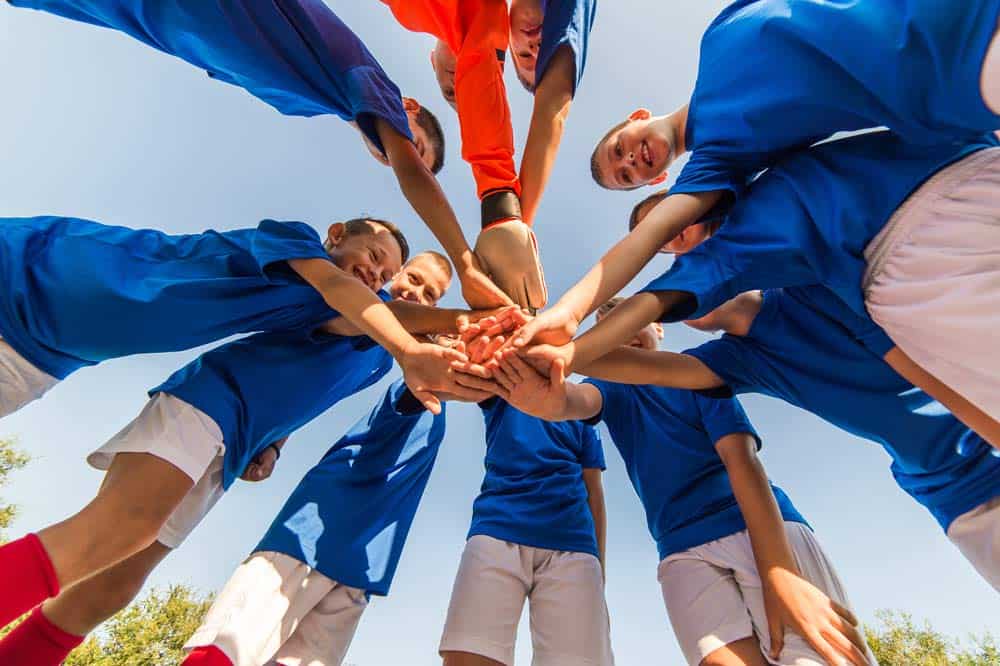Childhood is a critical period of growth and development. Children learn important knowledge and skills for their future during this time, including academics and life values. Participating in extracurricular activities, like team sports, can enhance a child’s life and education. It is a popular and beneficial option.
In this blog post, we will explore the numerous advantages that extracurricular activities, particularly team sports, offer to children. Team sports are crucial for a child’s comprehensive growth, contributing to physical health, mental wellness, and fundamental life abilities.
Physical Health Benefits of Extra Activities for Kids
Physical Fitness: Engaging in team sports encourages regular physical activity, helping children develop and maintain a healthy level of fitness. Activities like soccer, basketball, and baseball require cardiovascular endurance, strength, and agility, which contribute to a child’s overall health.
Motor Skills: Team sports promote the development of fine and gross motor skills. Kids learn to coordinate their movements, improving their hand-eye coordination, balance, and overall physical dexterity.
Healthy Habits: Participation in team sports fosters the establishment of healthy habits. Children learn about the importance of a balanced diet, proper hydration, and adequate rest for optimal performance
Reduced Risk of Obesity: The sedentary lifestyle that often accompanies excessive screen time can contribute to childhood obesity. Team sports provide an enjoyable way to keep kids active and reduce the risk of obesity-related health issues.
Mental and Emotional Well-Being
Stress Reduction: Team sports serve as a stress reliever for children. Physical activity triggers the release of endorphins, which can help reduce anxiety and improve mood.
Boosted Self-Esteem: Achieving success in sports activities can boost a child’s self-esteem. Achieving a fantastic move or netting a goal can boost self-assurance, which can then be applied to different aspects of life.
Friendship and Social Skills: Being part of a team fosters social connections and helps children develop valuable social skills. They learn how to communicate effectively, cooperate with others, and build meaningful relationships.
Discipline and Goal Setting: Team sports teach children about discipline and the importance of setting and working towards goals. They learn to manage their time, follow rules, and strive for improvement.
Life Skills and Values
Teamwork: Perhaps the most significant benefit of team sports is the opportunity to learn teamwork. Kids learn that teamwork is important for achieving goals and that everyone needs to work together for the team to succeed.
Leadership: Many team sports provide opportunities for children to assume leadership roles, whether as team captains or role models. These experiences help cultivate leadership qualities that can serve them well throughout life.
Resilience: Team sports offer valuable lessons in resilience. Children learn how to cope with losses, setbacks, and challenges, and they develop the ability to bounce back from adversity.
Sportsmanship: Learning to win graciously and lose with dignity is a vital aspect of participating in team sports. These lessons in sportsmanship extend beyond the field or court and into everyday life.

Time Management and Academic Performance
Playing team sports can help children manage their time better and perform better academically. This is contrary to the belief that extracurricular activities negatively impact academic success.
Time Management: Being involved in team sports requires children to manage their time effectively. They learn to balance practices, games, and schoolwork, which can lead to better time management skills overall.
Academic Motivation: Children who participate in team sports often exhibit higher levels of motivation in their studies. Knowing they need to maintain certain academic standards to continue playing can serve as a powerful incentive.
Improved Concentration: Physical activity and the mental engagement required in team sports can improve a child’s ability to concentrate, making it easier for them to focus on their studies.
Healthy Habits for a Lifetime
One of the most significant benefits of introducing children to team sports is the potential for instilling healthy habits that can last a lifetime. When children develop a love for exercise and sports, they are more likely to continue doing them as adults.
Continued Physical Fitness: Individuals who have a foundation in team sports during childhood are more likely to stay physically active throughout their lives. This can significantly reduce the risk of chronic health conditions associated with sedentary lifestyles.
Lifelong Social Bonds: The friendships and social connections formed through team sports often endure into adulthood. Many adults continue to participate in recreational sports leagues or maintain close friendships with former teammates.
Mental Well-Being: The stress-reducing and mood-enhancing effects of physical activity remain relevant throughout a person’s life. Engaging in sports can help individuals manage stress and maintain good mental health as adults.
Choosing the Right Sport
When considering team sports for your child, it’s important to keep in mind that not every sport will suit every child. Each sport offers unique challenges and experiences, so it’s essential to consider your child’s interests, physical abilities, and personality. Some popular team sports to consider include:
Soccer: Known for its emphasis on teamwork, soccer is a great sport for teaching cooperation and communication skills.
Basketball: Basketball emphasizes quick decision-making, agility, and endurance. It’s an excellent choice for kids who enjoy fast-paced action.
Baseball/Softball: These sports focus on hand-eye coordination, precision, and strategic thinking. They can be great for developing patience and perseverance.
Football: While physically demanding, football provides an opportunity for children to learn discipline, leadership, and the importance of following rules.
Volleyball: Volleyball promotes teamwork, communication, and spatial awareness. It’s a low-impact sport that can be accessible to a wide range of children.
Hockey: Ice or field hockey teaches children about balance, coordination, and the importance of strategy in a fast-paced environment.
Supporting Your Child in Team Sports
To help your child enjoy and benefit from team sports, it’s important to be a supportive and involved parent.
Encourage and Attend: Show enthusiasm for your child’s chosen sport and attend their games and practices. Your presence provides encouragement and support.
Emphasize Effort Over Outcome: Encourage your child to focus on effort and improvement rather than just winning. This attitude fosters a growth mindset and resilience.
Promote Balance: While team sports are valuable, ensure your child maintains a healthy balance between sports, academics, and downtime. Avoid over-scheduling.
Model Sportsmanship: Model good sportsmanship in your own life, and reinforce its importance to your child. Encourage them to be gracious in both victory and defeat.

Playing team sports has many advantages for kids, like staying fit, being mentally healthy, and learning important life skills and values. Team sports provide opportunities for children to grow, learn, and thrive in a supportive and engaging environment. Parents and caregivers can support children in leading healthier and happier lives. They can do this by encouraging children to enjoy being active and by working together with them.
As you consider the various extracurricular activities available to your child, remember the unique advantages that team sports can provide. They not only promote physical health but also offer invaluable life lessons that will serve your child well throughout their lifetime.
Encourage your child to explore different sports and discover the one that resonates with them the most. Team sports offer many chances for growth, development, and fun. Players can score goals in soccer, make three-pointers in basketball, or hit home runs in baseball.
Let’s celebrate teamwork, camaraderie, and life lessons in team sports. They help shape children into well-rounded individuals ready for future challenges and successes.

